NSW police ‘feared for their lives’ during raid on climate protesters says assistant commissioner
Police say group was planning ‘extreme forms’ of protest, activists say police actions were ‘insane overreach’
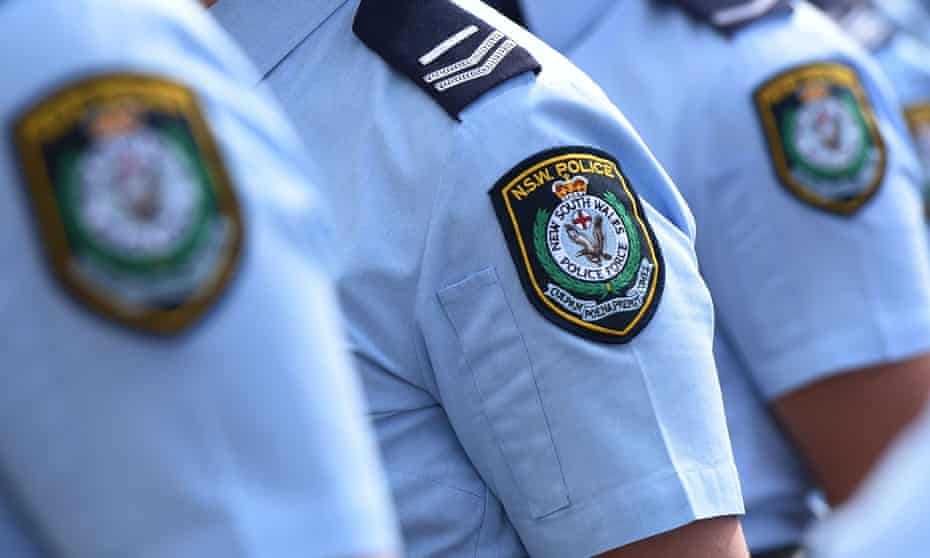 New South Wales police raided a climate protest group in Colo, in Sydney’s north-west on Sunday. Photograph: Dean Lewins/AAP
New South Wales police raided a climate protest group in Colo, in Sydney’s north-west on Sunday. Photograph: Dean Lewins/AAPChristopher Knaus
@knauscSun 19 Jun 2022
New South Wales police have defended their raid on a group of climate protesters in north-west Sydney on Sunday, alleging that the group was planning “extreme forms” of protest and acted aggressively towards officers.
On Sunday morning, police deployed in significant numbers to a property at Colo, in Sydney’s north-west, after a confrontation with Blockade Australia, a group that caused blockades at Port Botany, the city’s major port, in March.
Police had initially been surveilling the group at the property on Sunday. According to their defence lawyers, the protesters noticed strangers on the property and demanded they identify themselves and their reasons for being there.
Advertisement
The officers got into an unmarked car. The protesters are understood to have surrounded the car.
Police say they were being aggressive and slashed or let down the tyres of the vehicle.
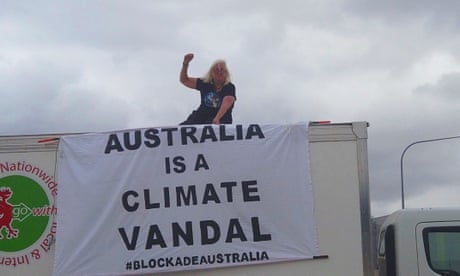
Activists dismiss NSW government crackdown on Sydney port protests
Read more
That prompted a more comprehensive police response, according to acting assistant commissioner, Paul Dunstan.
“Those police that were attacked by that group this morning feared for their lives,” he said. “They called for urgent assistance and police from all over the Sydney metropolitan area [who] responded to assist and provide aid to those police officers.”
There were no injuries to police.
Lawyers for the Blockade Australia activists said the protesters surrounded the car in an attempt to understand who the strangers were and what they were doing on the property.
Sydney City Crime, the firm representing the protesters, said police had no legal basis for being on the property.
“This is complete overreach,” principal lawyer Joe Harb told the Guardian. “It is clear that police came merely to provoke a reaction and now they want to cry that they were the victims and in fear.”
Lawyer Mark Davis, also of Sydney City Crime, said police were repeatedly asked to identify themselves.
“The protesters kept asking who they were and the police walked away, before an unmarked car pulled up and they got in,” he said.
“The protesters surrounded the car, demanding they identify themselves. They had no legal basis to be on the property.”
Blockade Australia protesters described the police actions on Sunday as “insane overreach” and a large-scale raid.
“Police are raiding our beautiful camp. Groups of cops in cammo (sic) gear with guns surrounded our camp this morning,” the group said in a statement on Facebook. “Dog squad, riot police, helicopters and fully militarised police are all over us.”
“This is how a system based on climate destruction responds to a movement of nonviolent climate defenders.”
The group said its protesters were non-violent.
“This massive, costly police operation is aimed at preventing climate activists from taking action. This is how Australia responds to a peaceful nonviolent network of ordinary humans who want humanity to survive.”
Activist Zelda Grimshaw told the Sydney Morning Herald it was an “unprecedented” level of police repression of the climate movement.
“We are now suffering multiple impacts of Australia’s continued climate destruction with unprecedented fires, floods, and repression,” she said.
Police were deployed from nearby police area commands, and from specialist resources including PolAir, the police dog squad, the riot squad, police rescue, and the operations support group.
Two people have been arrested and more arrests are planned, police say. Officers were still conducting a search of the property on Sunday afternoon.
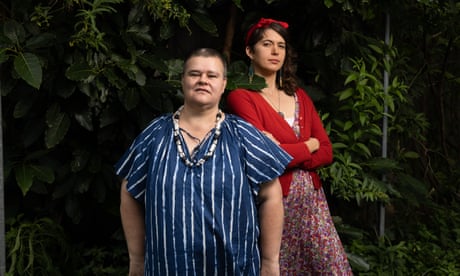
Fireproof Australia: who are the radical Extinction Rebellion splinter group?
Read more
Police established a strike force, named Strike Force Guard, after the earlier protests in March and NSW parliament to introduce new laws and penalties in April specifically targeting protests that blocked roads and ports.
Dunstan was asked what specifically police were investigating on Sunday, prior to the confrontation.
He alleged the activists were “practising, rehearsing and constructing items to conduct similar methods of protest that they conducted during the March protest activity, where you saw elaborate objects being formed and put in the middle of the roadways to ultimately disrupt vehicle activity and trains around the Sydney area”.
This article is more than 2 months old
Activists dismiss NSW government crackdown on Sydney port protests
State government announces strike force and penalties, while two German nationals will be deportedGet the free Guardian app; get our morning email briefing
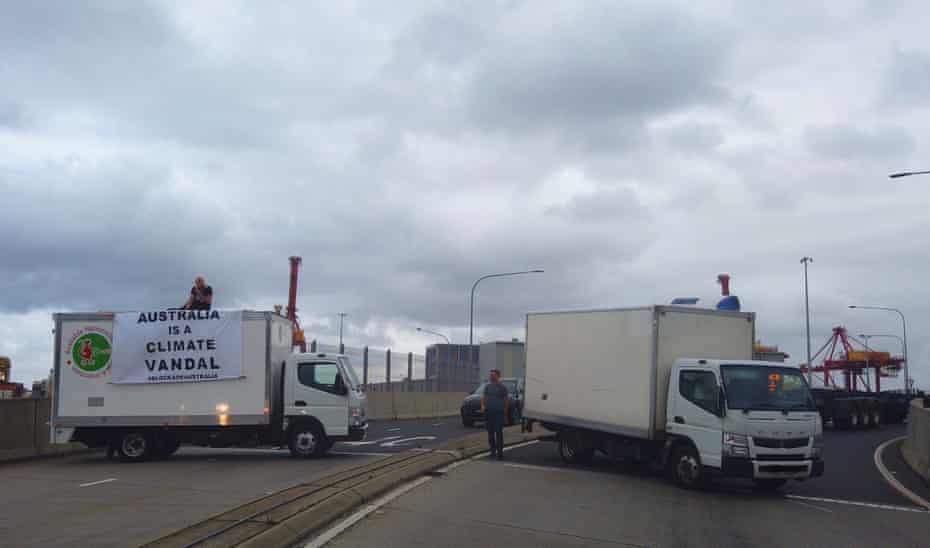 Protesters Helen Kvelde and Dominique Jacobs from Blockade Australia block traffic into Sydney's major port on Wednesday. Photograph: Blockade Australia
Protesters Helen Kvelde and Dominique Jacobs from Blockade Australia block traffic into Sydney's major port on Wednesday. Photograph: Blockade AustraliaMichael McGowan
@mmcgowanThu 24 Mar 2022 18.18 AEDT
Climate change protesters who have caused blockades at Sydney’s major port this week say tougher penalties and the deportation of two activists will not stop them from continuing their campaign.
The New South Wales government announced on Thursday that it would ramp up its response to protests by the climate group Blockade Australia, including the creation of a strike force aimed at disrupting activists, increased penalties and possible jail time.
The penalties, including fines of $22,000 and up to two years jail time for people who blockade tunnels and bridges, follow three days of protests around the port which have seen the arrests of five people including two German nationals.
Advertisement

The German nationals, who are brothers, have since had their visas cancelled.
The immigration minister, Alex Hawke, confirmed on Thursday they would be deported over their involvement in the protests this week, which blocked peak-hour traffic around Port Botany. One of the brothers has been refused bail and will face court again next week.
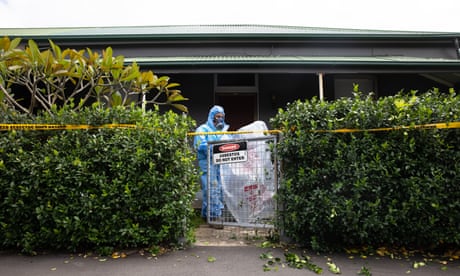
‘Appalling’: Newcastle residents question response after wool store fire showers homes with asbestos
Read more
After days of protests – and campaigning from Sydney radio station 2GB – the state’s acting premier, Paul Toole, held two separate press conferences on Thursday in which he also foreshadowed further “tough laws” to target protesters.
The government will also bring legislation to parliament which would expand the law to include roads and other major industrial and transport facilities.
“Groups like Blockade Australia, they have gotten a lot smarter than ever before. They’ve got legal teams that are actually doing work for them to actually work out what the penalties might be,” Toole told reporters. “Enough is enough.”
He also welcomed the cancellation of the visas of the two German nationals, saying: “Good riddance, we don’t want you here.
“They’ve got no place here in this country,” he said.
Toole called the protests a “kick in the guts” for farmers and miners, and said the decision to block traffic and slow the port’s operations was “disgraceful”.
Advertisement

Later on Thursday, Toole announced the establishment of a police strike force to “disrupt” the protesters, with assistant commissioner Peter Cotter flagging a heavy police presence and the use of proactive policing and stop and search powers in and around the port.
Sign up to receive an email with the top stories from Guardian Australia every morning
Sign up to receive the top stories from Guardian Australia every morning

But the group at the centre of the protests said they would not be deterred.
Among the five people arrested this week were 57-year-old preschool teacher Dominique Jacobs from Gloucester in the Hunter Valley and 71-year-old psychologist Helen Kvelde. On Wednesday afternoon they blocked a major road into the port with two trucks.
Kvelde locked herself to the steering wheel with a bike lock while Jacobs climbed on top of the second truck and unfurled a banner reading “don’t negotiate with climate criminals”.
While the threat of increased punishments was daunting, both women said it would not have stopped them taking the action.
“It wouldn’t make a scrap of difference to me,” Jacobs said. “I’m more frightened of the climate emergency than I am of their harsher penalties.”
Kvedle, a longtime environmental activist who lives in regional NSW, accused the government of “cynicism” for introducing the penalties.
“They only care about money and they only want to stop people who might be affecting the economy,” she said.
Quick Guide
How to get the latest news from Guardian AustraliaShow

Blockade Australia’s main spokesperson, Clancey Maher, who was arrested during its last major action disrupting Newcastle coal port in November last year, confirmed the group would not be deterred by the government.
“In regards to the development of the strike force and the harsher penalties and the threat of deportation, they’re all designed as deterrents and what I can say is none of them are working,” she said.
“None of the people currently engaged in Blockade Australia is backing down. One of the important things is to acknowledge that all of those actions by the government is to do just that. It’s to instil fear in people.”
Advertisement

The new penalties were supported by the Labor leader, Chris Minns, who dismissed fears that the extension of police powers posed a threat to civil liberties, saying the protests had caused “serious damage to the NSW economy”.

“It’s almost impossible to think of anything more disruptive, or damaging to the environmental cause, or the cause for climate change than the actions of these people,” he said.
“At the very moment when we’re trying to build a coalition around climate change, to make it a mainstream issue and to ensure that it has bipartisan support and the support of millions of people right across Australia, but in particular in Sydney, in western Sydney, this is one of the most damaging things that anybody could do.”
But the Greens MP David Shoebridge savaged the government, calling it a “politically motivated crackdown on legitimate political expression”.
“This isn’t the first time the Coalition has moved to criminalise protest, having already put in place harsh criminal penalties for any protest that disrupts fossil fuel production,” he said.
“In the face of global wars and human rights abuses and with our own communities reeling from catastrophic floods made worse by climate change, the right to demand action on climate and to defend human rights must be protected.
“Every tonne of coal, oil and gas we burn will increase the intensity and speed of climate change– the activists standing up to stop this should be congratulated, not arrested.”
===
Fireproof Australia: who are the radical Extinction Rebellion splinter group?
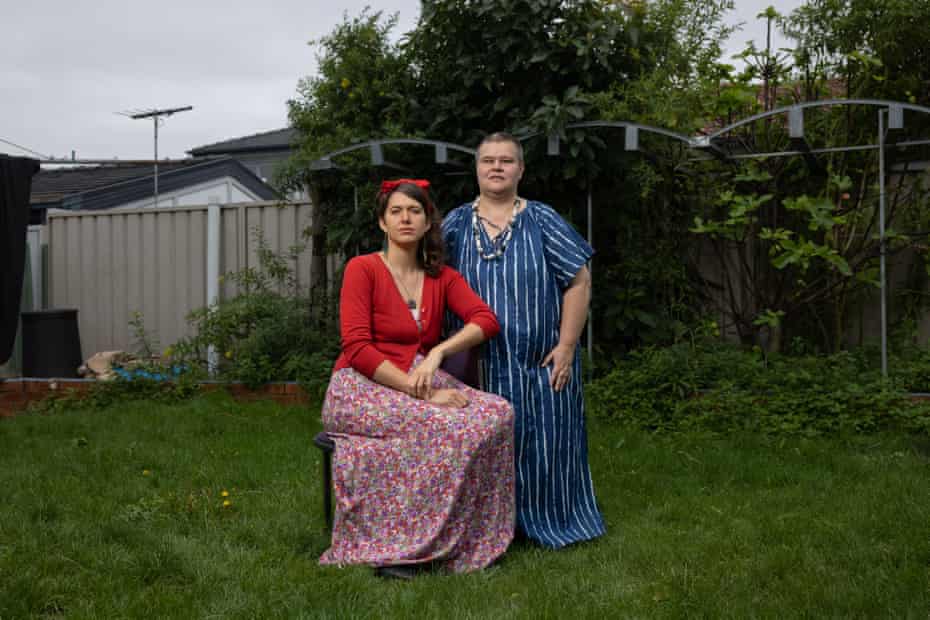 Violet Coco and Sam Noonan are both members of the Fireproof Australia activist group. Photograph: Carly Earl/The Guardian
Violet Coco and Sam Noonan are both members of the Fireproof Australia activist group. Photograph: Carly Earl/The GuardianThey have blocked major roads, obstructed traffic on the Sydney Harbour Bridge and been denounced by Dominic PerrottetDownload the free Guardian app; get our morning email briefing
Royce Kurmelovs
@RoyceRk2Sun 10 Apr 2022 06.00 AEST
142
It was the re-election of a Coalition government in May 2019 that altered the trajectory of Sam Noonan’s life and politics.
“I didn’t really care about politics until then,” Noonan says. “But then a lightbulb went off, and I kind of went, ‘Well, this is not working, we need to do something.’”
At first the 48-year-old helped organise climate rallies in her region, but it was Extinction Rebellion – the group which caused widespread disruption in London in November 2018 – that captured her attention.
The group members’ willingness to face a strong possibility of being arrested appealed to her, as they appeared to take the catastrophic risk of climate change seriously.
Advertisement
“[I felt] these, you know, radical, annoying, disruptive, interfering sort of tactics were probably our last chance of doing something,” Noonan says. “I just knew, intuitively, that this is where I needed to be.
“I always said to my husband once we started all this activism that even if all else fails and we can’t save the planet, I want to know that I tried and be able to say to my grandkids, I really did my best, I did my best at the time.”
A few months after Noonan joined Extinction Rebellion, the Black Summer bushfires swept through New South Wales, Victoria and parts of South Australia, changing her life again.
Noonan, who is blind, had to confront the possibility of fleeing her home in the Illawarra, south of Sydney.
“Fires were coming from three directions at once,” Noonan says. “I was there wondering if I could evacuate out of Dapto because I didn’t have anyone who could drive the car and a lot of the train lines were down.”
After the catastrophic event that left 18,000 Australians internally displaced, Noonan joined a new protest group calling themselves Fireproof Australia.
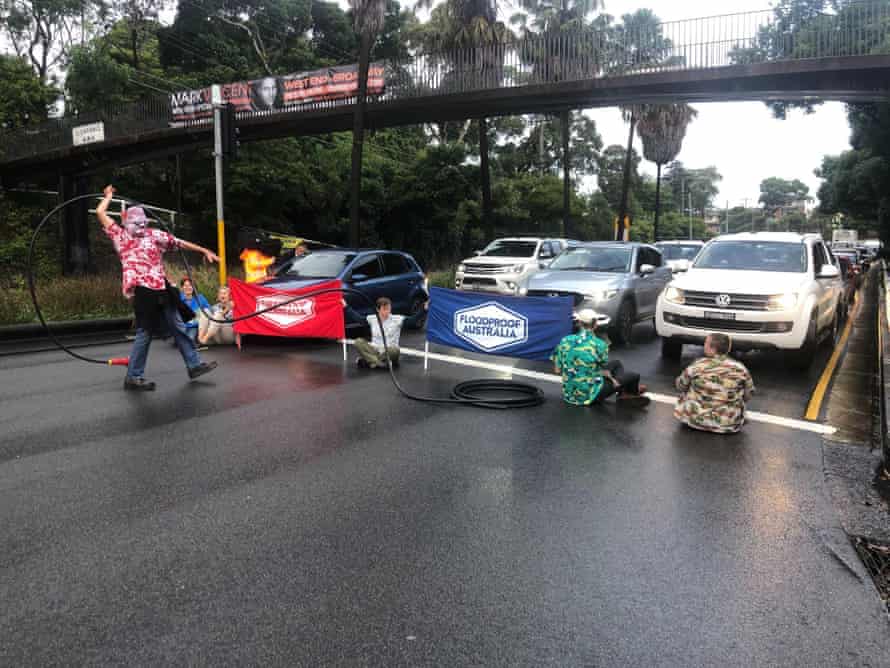 Fireproof Australia taking their first roadblock action on the Princes Highway in Sylvania, NSW. Photograph: Fireproof Australia
Fireproof Australia taking their first roadblock action on the Princes Highway in Sylvania, NSW. Photograph: Fireproof AustraliaAdvertisement
In recent weeks the group has been grabbing headlines for blocking major roads during the morning peak hour to call for immediate action on climate change, including obstructing traffic on the Sydney Harbour Bridge at least three times.
The NSW government rushed through strict laws to curb the protests, and the premier, Dominic Perrottet, attacked Fireproof Australia for their disruptive tactics.
“This type of behaviour needs to stop,” Perrottet said. “People have the right to protest, people have the right to free speech, we promote that.
“But don’t do it at the expense of people trying to get to and from work, trying to get their kids to school, stopping people earning a living and a wage – that’s what these protests are doing.
“We’ve passed the laws, we’ll throw the book at these people, because their behaviour is completely unacceptable.
“And if you really want to lose support in the community for your cause, keep acting like that.”
‘We tried protesting’
This week the Intergovernmental Panel on Climate Change (IPCC) released its latest comprehensive review, saying it was “now or never” to prevent catastrophic climate change.
Protest groups around the world have been growing more ambitious in response to what they see as an emergency.
Among those that have emerged in the UK are Tyre Extinguishers, which encourages people to deflate the tyres of SUV owners, and Just Stop Oil, which targets oil infrastructure.
Groups such as Fireproof Australia, Floodproof Australia and Blockade Australia are local variations who employ direct action in a campaign of “civil resistance” against governments which they believe aren’t acting fast enough on climate change.
Violet CoCo, a Fireproof Australia member, says the group splintered from Extinction Rebellion in May 2021 to take the protests to a new level.
“Fireproof Australia is designed to be more disruptive and more accessible in that disruption,” CoCo says. “All you need to do is sit down on a road to participate, you don’t need to wear a fancy costume.”
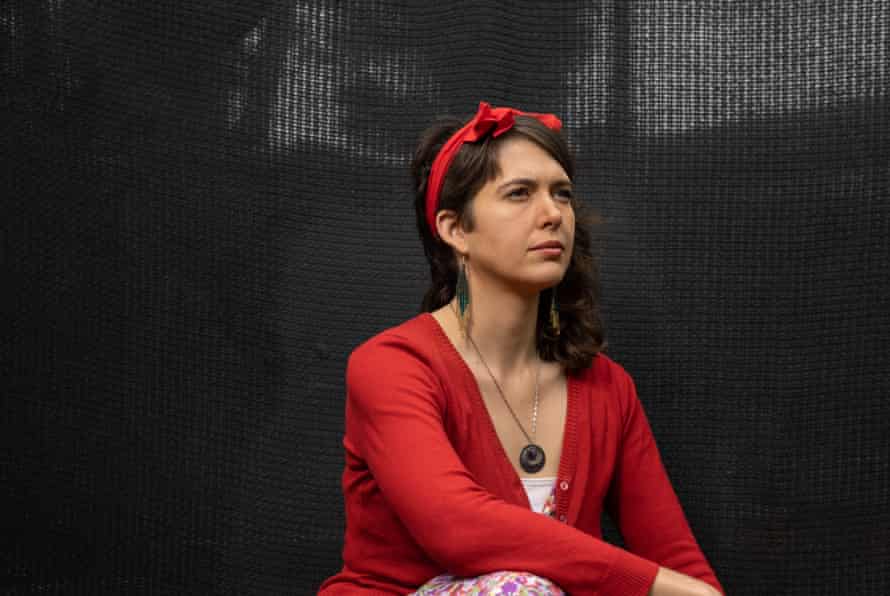 Violet Coco, a member of the Fireproof Australia activist group. Photograph: Carly Earl/The Guardian
Violet Coco, a member of the Fireproof Australia activist group. Photograph: Carly Earl/The GuardianAdvertisement
They also have different demands. Extinction Rebellion wants governments to declare a climate emergency and rapidly cut emissions to zero by 2025 while Fireproof Australia’s goals are more immediate.
CoCo says the group wants a permanent, Australian-based air tanker fleet to fight bushfires, smoke-proof schools, aged care and disability centres to protect the vulnerable, and an immediate plan to rehome flood and fire survivors.
Some commentators who support urgent action on the climate crisis have criticised direct action tactics as counterproductive, warning they may alienate the very people who need to be persuaded. Writing in the Nine newspapers last month, the social researcher Rebecca Huntley said people who were “disengaged, uncertain or sceptical” were less likely to listen to someone who was making it harder for them to get to work.
“In the qualitative research I have done, groups such as Extinction Rebellion come up in conversation in a very negative way and can be a barrier to talking about global warming and how climate action might actually improve their lives,” Huntley wrote.
But CoCo says every other attempt to get governments to act has failed.
“We tried,” CoCo says. “We tried protesting to the politicians. We’ve tried one-day marches. Nothing happened. And so now we need to escalate these disruptive tactics.”
The group is often associated with Blockade Australia, whose members obstruct physical infrastructure such as rail lines or cranes, although the two groups are separate.
Blockade Australia’s membership is drawn from several campaigns, including Rising Tide, which targeted the coal industry in Newcastle, and anti-Adani protesters from Queensland.
The group’s first major action was obstructing coal trains at Newcastle, the largest coal port in the world in November 2021, prompting an attack from Barnaby Joyce, who said $60m in exports had been lost in one week.
In recent weeks the group has targeted Port Botany in Sydney, Australia’s largest container port, which led to the arrest of Maxim Curmi, who was jailed for four months after he scaled a 60m crane.
Unlike other groups, Blockade Australia has no specific goals. Maddie, a spokesperson who declined to give her surname citing the risk of arrest, says it is focused on “building momentum” as it “doesn’t see any worth in appealing to the goodwill of a system that doesn’t have any”.
‘Method to their madness’
Advertisement
The hurried NSW legislation in response to the street and industry blockades has been branded a “draconian” attempt to criminalise the right to protest by 40 civil society groups, including the NSW and Act Aboriginal Legal Service, the NSW Council for Civil Liberties, Human Rights Law Centre, Environmental Defenders Office and Australian Democracy Network.
Piero Moraro, a lecturer in criminology at Edith Cowan University who studies civil disobedience, says the right to protest can simply be restrained to “waving flags under the eyes of the police”.
As much as governments and commentators may cast militant or disruptive protest groups as troublemakers and even criminals, Moraro says they can drive change thanks to the “radical flank effect”.
“It is a reference to Martin Luther King,” Moraro says. “One reason why he was successful is that you also had the Black Panthers. White America was faced with the choice to either go with King or face more radical protests.”
Associate prof Hans Baer, an honorary research fellow at the University of Melbourne, says there is a risk disruptive protests will “put off mainstream Australia”, but they are also necessary.
“It’s the more radical people who get the attention that pushes the more middle of the road people to act,” Baer says.
“There may be a method to their madness. So long as it doesn’t hurt people, if it only hurts infrastructu
